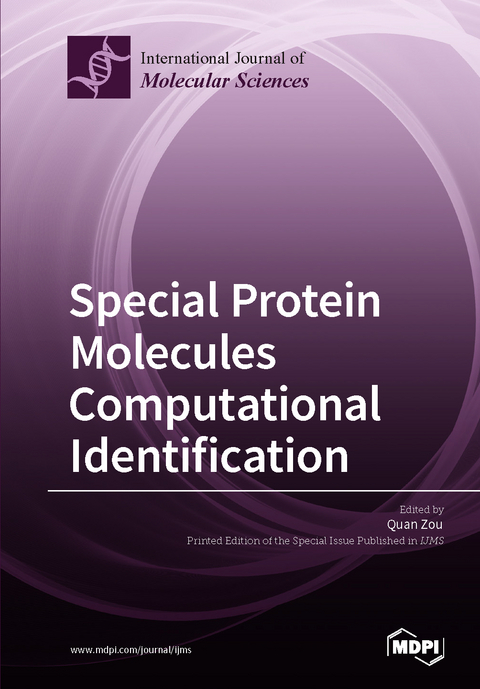
Special Protein Molecules Computational Identification
Seiten
2018
MDPI (Verlag)
978-3-03897-043-9 (ISBN)
MDPI (Verlag)
978-3-03897-043-9 (ISBN)
- Titel nicht im Sortiment
- Artikel merken
It is time consuming and costly to detect new molecules of some special proteins. These special proteins include cytokines, enzymes, cell-penetrating peptides, anticancer peptides, cancer lectins, G-protein-coupled receptors, etc. Researchers often employ computer programs to list some candidates, and to validate the candidates with molecular experiments. These computer programs are key to possible savings on wet experiment costs. Software results with high false positive will lead to high costs in the validation process.
In this Special Issue, we focus on these computer program approaches and algorithms. Some "golden features" from protein primary sequences have been proposed for these problems, such as Chou’s PseAAC (pseudo amino acid composition). PseAAC has been tried on nearly all kinds of protein identification, together with SVM (support vector machines, a type of classifier). However, I prefer special features, and classification methods should be proposed for special protein molecules. "Golden features" cannot work well on all kinds of proteins. I hope that submissions will focus on a type of special protein molecule, collect related data sets, obtain better prediction performance (especially low false positives), and develop user-friendly software tools or web servers.
In this Special Issue, we focus on these computer program approaches and algorithms. Some "golden features" from protein primary sequences have been proposed for these problems, such as Chou’s PseAAC (pseudo amino acid composition). PseAAC has been tried on nearly all kinds of protein identification, together with SVM (support vector machines, a type of classifier). However, I prefer special features, and classification methods should be proposed for special protein molecules. "Golden features" cannot work well on all kinds of proteins. I hope that submissions will focus on a type of special protein molecule, collect related data sets, obtain better prediction performance (especially low false positives), and develop user-friendly software tools or web servers.
| Erscheinungsdatum | 03.07.2018 |
|---|---|
| Mitarbeit |
Gast Herausgeber: Quan Zou |
| Verlagsort | Basel |
| Sprache | englisch |
| Themenwelt | Informatik ► Theorie / Studium ► Künstliche Intelligenz / Robotik |
| Informatik ► Weitere Themen ► Bioinformatik | |
| Naturwissenschaften ► Biologie ► Allgemeines / Lexika | |
| Schlagworte | anticancer peptides • Bioinformatics • cell-penetrating peptides • DNA/RNA binding proteins • Feature Selection • machine learning • MHC binding peptide • Oncogene • Prediction • protein classification • Proteomics • PseAAC features • type III secreted proteins |
| ISBN-10 | 3-03897-043-3 / 3038970433 |
| ISBN-13 | 978-3-03897-043-9 / 9783038970439 |
| Zustand | Neuware |
| Haben Sie eine Frage zum Produkt? |
Mehr entdecken
aus dem Bereich
aus dem Bereich
Buch | Softcover (2024)
REDLINE (Verlag)
20,00 €
Eine kurze Geschichte der Informationsnetzwerke von der Steinzeit bis …
Buch | Hardcover (2024)
Penguin (Verlag)
28,00 €


